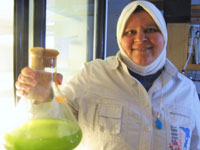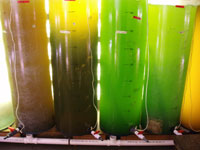 |
 |
|
 |
 |
 |
 |
 |
|
 |
 |
 |
 |
July 10, 2009
Perfecting Algal Biodiesel MBL Visiting Researcher Searches for the Best Way to Grow Algae for Fuel
By Julia Darcey
 |
 |
 |
Photos:
Click thumbnail for larger image:

Nagwa Mohammady cultures microalgae in the laboratory. Each flask holds a different species. Credit: Julia Darcey/MBL

The populations of microalgae that Mohammady is using are maintained at the MBL in beakers or these giant vats. Each vat contains a single species, and the MBL staff has to be careful to avoid contamination. Credit: Kara Maloney
|
MBL, WOODS HOLE, MA—To most people, algae may not seem worth a trip across the globe. After all, these tiny photosynthetic cells aren’t even advanced enough to be called plants—more often they go by the unflattering nickname of “pond scum.”
But fast-growing, sun-harvesting microalgae may also be the best way of producing biodiesel. That’s why Nagwa Mohammady decided to leave behind the hot, dry summer in Alexandria, Egypt, and come to the MBL to work with Scott Lindell, director of the MBL’s Scientific Aquaculture Program. With the help of the MBL’s research facilities and stocks of native algae, Mohammady, who is here as a Lucy B. Lemann Fellow, hopes to single out the best species and the best conditions for producing algal biofuel.
In the last few years, algae have gained fame as being among the best organisms for making biodiesel cheaply enough to compete with fossil fuels. According to U.S. Department of Energy estimates, algae can theoretically yield 30 times more biodiesel per acre per year than land crops, such as soybean. Algae are grown industrially in saltwater ponds, tanks, or a series of pipelines, so they can be produced on substandard land without large amounts of fresh water. And unlike most biodiesel crops, Mohammady adds, “people don’t depend on algae as a food source.”
However, reaching the theoretical fuel output of microalgae has proven difficult. Algae that grow well in lab flasks often die in large industrial operations that span acres. With over 200,000 known species of algae from almost every imaginable aquatic habitat, research like Mohammady’s to identify the most optimal species is a vital step in making algal biodiesel possible and profitable.
Mohammady, a member of the faculty of science at Alexandria University, is at the MBL to put some of the top algal candidates to the test. During her visit, she will culture many different species of algae that are already known to have high oil content. She will also grow each species under different conditions, to find out what kind of environment promotes the most algal growth. At the end of each test, Mohammady will harvest the cells and extract fatty acid oils from them. These oils will then be converted into biodiesel fuel through a series of chemical reactions with the help of Chris Reddy at the WHOI Chemistry Department. Mohammady’s goal is to find the combination of species and conditions that produces the most biodiesel at the end of the process.
The MBL presents a unique opportunity for Mohammady. She says that the facilities at the MBL allow her to get work done more quickly than the labs back home in Egypt.
“The scientists here are…open-minded, and the facilities are most advanced,” she says, with a smile.
The blue Atlantic waters at the MBL’s doorstep offer another valuable resource for Mohammady: native saltwater microalgae. Many of the species Mohammady is studying are found in the Northeast Atlantic and are maintained on site at the MBL.
Mohammady’s journey has been serendipitous for the MBL. According to Lindell, Mohammady’s results will hopefully be used on the industrial scale by a recently formed consortium that includes the MBL, and which is focusing on algae to biofuels research. “It was a really fortuitous coincidence,” Lindell said. The MBL is working with the Regional Technology Development Corp. of Cape Cod, the Woods Hole Oceanographic Institution, the Cape Cod Commission and a commercial company, Plankton LLC, on the biodiesel project. The partners recently submitted a joint grant to fund their collaborative research.
But Mohammady also hopes that her research will help move the field forward in Egypt. She plans to use what she’s learned about algae at the MBL to advise and support growing biodiesel companies in Egypt. So whatever Mohammady discovers about these tiny organisms, it’s sure to be well worth the long trip—on both sides of the Atlantic.
|
| |

 |
|
 |
 |
|